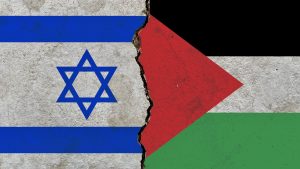The weekend’s surprise and brutal attack on Israel by Hamas fighters has the potential to reshape the Middle East – and will only further increase global geopolitical instability. So far, the assault by Hamas on Israel has taken at least 900 Israeli lives – easily making it the bloodiest time for Israel since the 1973 Yom Kippur War. In addition, dozens of Israelis have been kidnapped and taken back to Gaza to be used as bargaining chips.
Israel has responded fiercely, with airstrikes and preparation for an on-the-ground assault against the Gaza Strip. At least 765 Palestinians have been killed and Israel has instituted a full-on siege, with Defense Minister Yoav Gallant demanding that “no electricity, no food, no fuel” be allowed to reach Gaza.
While there will be a range of motivations for why Hamas chose to act in the way it did now, the symbolic timing of Hamas’ assault – almost 50 years to the day after Yom Kippur – is unlikely to be a coincidence.
In recent years, Western countries such as New Zealand have largely taken their eyes off the Middle East to focus on the war in Ukraine and rising geopolitical tensions in the Indo-Pacific. A staple of New Zealand’s world news diet in decades past, of late the Israeli-Palestinian conflict has only rarely made the headlines. When it has, New Zealand has preferred not to become involved to any real extent, beyond expressing sympathy with the victims. For example, when conflict broke out over Gaza in 2021, then-Prime Minister Jacinda Ardern cut an image that resembled more that of an observer or commentator, rather than of a participant in international affairs.
The new Hamas assault is a reminder of the continued power of the Middle East to shock and surprise. While it is too early to tell how the conflict will unfold, one of the most concerning aspects will be the extent to which other nation-states become involved – particularly Iran, a close supporter of Hamas. The risk is that the war could spiral out of control and become a wider conflict with an even greater global impact, in an echo (or, potentially, an even more dangerous version) of the Yom Kippur War of 1973.
With New Zealand going to the polls later this week, determining the country’s response to the new war in the Middle East will be one of the new government’s first challenges – and as shown by the fierce reaction to the initial lack of direct condemnation of the Hamas assault by Nanaia Mahuta, it will not be an easy path to navigate. A sustainable and durable two-state solution is the only long-term answer to the Israeli-Palestinian conflict. But with Israel now defending itself against a vicious and horrific attack by Hamas, and planning a new ground invasion of Gaza, this will not be on the table in the near future.
However, New Zealand should resist the temptation to lose hope or to see the war as simply someone else’s problem. As the war in Ukraine has shown, distant wars can have an outsized impact, even half a world away.
Crude oil prices have already risen sharply this year – and combined with a strengthening U.S. dollar, these have caused New Zealand petrol prices to head back up to levels last seen in the immediate aftermath of Russia’s invasion of Ukraine. The pain caused by rising inflation and the cost-of-living crisis – the number one issue of the election campaign – may not be over yet.
As a small democracy far from the epicenter of the conflict, New Zealand could eventually play a role in peacemaking efforts – if it wants to. We should not forget that as horrific as the Yom Kippur War in 1973 was, the Camp David Accords came just five years later in 1978. These led to Egypt signing a peace treaty with Israel in 1979, a settlement that has endured.
The darkest moment can sometimes come before the dawn. There will absolutely be a need for de-escalation, dialogue, and diplomacy in the days, weeks, months, and years ahead – and countries will be sorely needed to lead and support these efforts.
This article was originally published by the Democracy Project, which aims to enhance New Zealand’s democracy and public life by promoting critical thinking, analysis, debate, and engagement in politics and society.

































